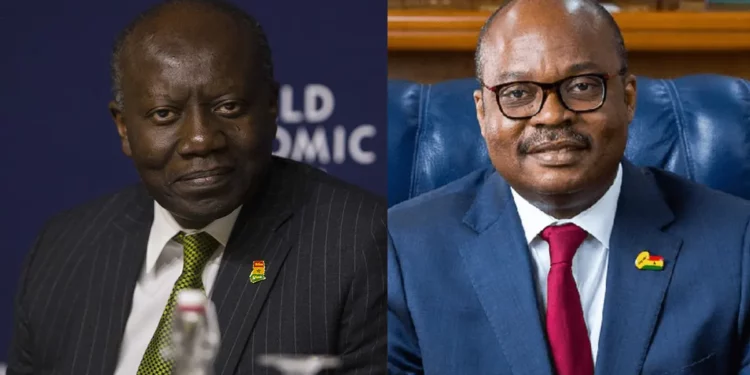IMF Conditionalities: Prior Action 4 – Sign MoU between MoF and BoG to eliminate monetary financing of the Central Government
Overview
The IMF has imposed a prior action on Ghana, requiring the signing of a Memorandum of Understanding (MoU) between the Ministry of Finance and the Bank of Ghana. This condition aims to eliminate the practice of monetary financing of the Central Government.
The information suggests that Ghana was facing a situation where the Central Government relied on direct borrowing from the central bank, known as monetary financing. This practice can have negative consequences for the economy, such as inflationary pressures and weakened central bank independence.
By signing the MoU, Ghana seeks to address the issue of fiscal dominance, where fiscal policy decisions exert undue influence on monetary policy. This undermines the independence of the central bank and hampers its ability to effectively implement monetary policy to achieve macroeconomic stability.
The objective of eliminating monetary financing of the Central Government indicates that Ghana needed to reduce its reliance on central bank financing and establish a more sustainable framework for government borrowing. This involves seeking alternative sources of financing, such as domestic and international markets, rather than relying on direct borrowing from the central bank.
Failure to achieve the objective of eliminating monetary financing could lead to several risks and implications. Firstly, it could contribute to inflationary pressures as the increased money supply resulting from direct central bank financing can lead to excessive money creation. This, in turn, can erode the value of the currency and negatively impact price stability.
Moreover, continued fiscal dominance and reliance on monetary financing could undermine the independence of the central bank. This could limit the central bank’s ability to set interest rates and implement effective monetary policy to manage inflation and promote economic stability.
By signing the MoU and eliminating monetary financing, Ghana aims to mitigate these risks, strengthen central bank independence, and enhance the transmission of monetary policy. This would create a more favorable environment for macroeconomic stability, sustainable economic growth, and investor confidence.
Overall, the prior action focuses on reducing fiscal dominance, reinforcing central bank independence, and improving the effectiveness of monetary policy transmission. Achieving these objectives would enable Ghana to establish a more sustainable and stable economic framework, which is crucial for long-term economic development.
Policy Impact Analysis:
- Potential Impact on Inflation: The elimination of monetary financing aims to address the inflationary pressures associated with excessive money creation. However, the adjustment process may initially disrupt the balance between fiscal and monetary policy, potentially affecting the overall price levels in the economy. Citizens may experience higher inflation rates, which can erode their purchasing power and reduce the affordability of goods and services.
- Economic Uncertainty: The transition away from monetary financing and the establishment of alternative sources of financing for the government can introduce uncertainties in the financial and economic landscape. Changes in borrowing practices may impact interest rates, credit availability, and overall economic conditions. These uncertainties can create challenges for businesses, investment decisions, and overall economic growth, potentially affecting job opportunities and income levels for citizens.
- Potential Impact on Government Spending: Eliminating monetary financing requires Ghana to seek alternative sources of financing, such as domestic and international markets. Depending on the availability and conditions of these sources, there may be implications for government spending priorities and allocations. Citizens may experience changes in public expenditure patterns, potentially affecting the provision of essential services and infrastructure development.
- Short-Term Adjustment Challenges: The shift away from monetary financing may require the government to make short-term adjustments to its fiscal and monetary policies. These adjustments can have immediate impacts on citizens, including changes in interest rates, exchange rates, and access to credit. Such changes can affect borrowing costs, investment decisions, and overall financial stability, potentially impacting individuals and businesses.
- Potential Impact on Central Bank Independence: The prior action aims to reinforce the independence of the central bank by reducing fiscal dominance. However, the process of aligning fiscal and monetary policies may involve challenges and potential conflicts of interest. If central bank independence is compromised, it can affect the ability of the central bank to effectively manage monetary policy, which can have consequences for overall economic stability and citizens’ confidence in the financial system.
- Adjustments in Government Financing: Shifting away from monetary financing may require the government to rely more on external borrowing or domestic debt markets. Depending on the terms and conditions of these financing sources, there may be implications for the country’s debt burden and debt service obligations. Higher debt levels can constrain government resources and potentially limit fiscal space for social programs and investments that directly benefit citizens.
- Potential Impact on Investor Confidence: The successful implementation of the prior action to eliminate monetary financing can contribute to increased investor confidence in Ghana’s economic management. However, any challenges or uncertainties during the transition process may negatively impact investor sentiment and foreign direct investment. This can have indirect consequences for citizens, such as reduced job opportunities, limited economic growth, and potential capital outflows.
It is crucial for Ghana to carefully manage the transition away from monetary financing, mitigate short-term disruptions, and ensure effective coordination between fiscal and monetary policies. Implementing measures to maintain price stability, enhance investor confidence, and safeguard the provision of essential services will be vital to minimize the potential negative impacts on citizens and promote sustainable economic development.








